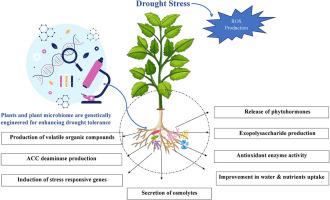通过微生物和作物品种生物工程缓解干旱胁迫,促进可持续农业和粮食安全
IF 4.8
Q1 MICROBIOLOGY
引用次数: 0
摘要
气候变化与农业有着内在的联系,气候条件的突然变化对全球粮食生产和安全造成了不利影响。干旱和高温等与气候变化相关的非生物胁迫导致作物歉收。最严重的非生物胁迫干旱会严重影响气孔关闭、活性氧的产生、蒸腾作用、光合作用或其他生理过程和植物形态,并对植物生长和作物产量产生不利影响。因此,迫切需要成本效益高、生态友好的现代技术来诱导作物植物的耐旱性,从而形成适应气候的可持续农业实践,实现持续的粮食生产。在这方面的众多选择中,使用植物生长促进微生物(PGPMs)是促进作物植物抗旱能力的最可持续的方法,可改善植物生长和提高作物产量。这些植物生长促进微生物通过各种直接或间接机制赋予作物抗旱能力,包括产生抗氧化剂、酶、外多糖、调节植物激素水平、通过诱导糖类积累进行渗透调节,以及增加养分、水分吸收和光合色素。然而,一些技术和生态方面的挑战限制了它们在农业中的应用,有时在田间条件下,用植物有益微生物处理植物并不能产生预期的效果。因此,开发合成微生物群落或宿主介导的微生物组工程,或开发具有表达所需性状能力的转基因植物,可促进植物在干旱胁迫条件下的生存和生长。本综述批判性地评估了有关 PGPMs 及其基因促进植物生长和抗逆潜力的研究证据,以此作为开发抗旱植物的一种方法,从而提高作物产量。科学界、政策制定者和监管机构之间需要开展有效合作,以建立强有力的框架,促进和规范在农业中利用合成微生物群落和转基因植物。本文章由计算机程序翻译,如有差异,请以英文原文为准。

Drought stress mitigation through bioengineering of microbes and crop varieties for sustainable agriculture and food security
Climate change and agriculture are intrinsically connected and sudden changes in climatic conditions adversely impact global food production and security. The climate change-linked abiotic stressors like drought and high temperatures are resulting in crop failure. The most severe abiotic stress drought significantly affect the stomatal closure, production of reactive oxygen species, transpiration, photosynthesis or other physiological processes and plant morphology, and adversely affect plant growth and crop yield. Therefore, there is an exigent need for cost effective and eco-friendly modern technologies to induce drought tolerance in crop plants leading to climate-adapted sustainable agricultural practices for sustained food production. Among many options being pursued in this regard, the use of plant growth promoting microbes (PGPMs) is the most sustainable approach to promote drought stress resilience in crop plants leading to better plant growth and crop productivity. These PGPMs confer drought resistance via various direct or indirect mechanisms including production of antioxidants, enzymes, exopolysaccharides, modulation of phytohormones level, osmotic adjustment by inducing the accumulation of sugars, along with increases in nutrients, water uptake and photosynthetic pigments. However, several technological and ecological challenges limit their use in agriculture and sometimes treatment with plant beneficial microbes fails to produce desired results under field conditions. Thus, development of synthetic microbial communities or host mediated microbiome engineering or development of transgenic plants with the capacity to express desired traits may promote plant survival and growth under drought stress conditions. The present review critically assesses research evidence on the plant growth and stress resilience promoting potentials of PGPMs and their genes as an approach to develop drought resilient plants leading to increased crop productivity. Effective collaboration among scientific communities, policymakers and regulatory agencies is needed to create strong frameworks that both promote and regulate the utilization of synthetic microbial communities and transgenic plants in agriculture.
求助全文
通过发布文献求助,成功后即可免费获取论文全文。
去求助
来源期刊

Current Research in Microbial Sciences
Immunology and Microbiology-Immunology and Microbiology (miscellaneous)
CiteScore
7.90
自引率
0.00%
发文量
81
审稿时长
66 days
 求助内容:
求助内容: 应助结果提醒方式:
应助结果提醒方式:


